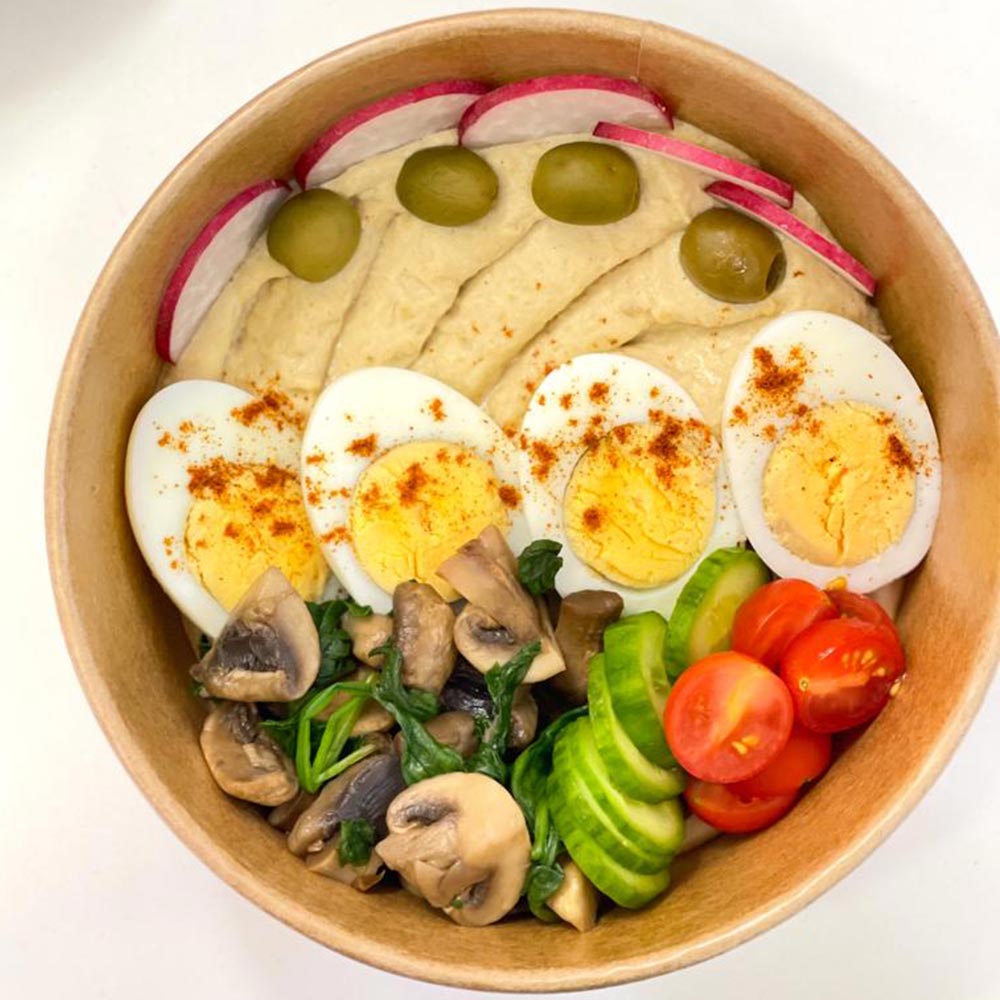Are you prepared to start your road toward developing a robust and powerful frame? In order to achieve your bodybuilding ambitions, you must adopt a lifestyle that includes discipline, commitment, and a strong emphasis on nutrition. In order to stimulate muscle growth, reduce body fat, and improve performance overall, a proper diet meal plan is essential. An effective Energy Meal Plan makes sure that you provide your body with the nutrition it needs to rebuild, repair, and develop muscle while also ensuring that you have enough energy throughout the day.
The value of a bodybuilding meal plan
A meal plan gives your nutritional intake structure and regularity, removing uncertainty and guaranteeing that you regularly satisfy your body's needs. It assists you in obtaining the ideal ratio of macronutrients—carbohydrates, proteins, and fats—and micronutrients—vitamins and minerals—necessary for muscle development and repair. By adhering to a meal plan, you can time your nutrients optimally, ensuring that you properly nourish your body before and after exercises.
Macronutrients and Micronutrients: An Overview
It's important to comprehend the function of macronutrients and micronutrients in bodybuilding before delving into the specifics of a 7-day diet plan. Carbohydrates, proteins, and fats are examples of macronutrients that give off energy in the form of calories. Proteins repair and grow muscle, while fats assist hormone synthesis and general health. Carbohydrates fuel your workouts.
On the other hand, micronutrients, which include vitamins and minerals, are crucial for a number of biological processes. They support a number of functions, including the metabolism of energy, immunological response, and tissue repair. An appropriate consumption of both macronutrients and micronutrients is guaranteed by a well-rounded meal plan.

Making a 7-Day Bodybuilding Meal Plan
Let's now go into the specifics of a 7-day food schedule designed to satisfy the dietary requirements of bodybuilders. It's crucial to remember that individual needs might change depending on things like body weight, aspirations, and exercise levels. A nutritionist or dietitian consultation can result in tailored advice.
Monday
1. Oatmeal, a pear, and scrambled eggs for breakfast.
2. Snack: Blueberries and low-fat cottage cheese.
3. Broccoli, white rice, and a venison burger for lunch.
4. Snack: A banana and a protein smoothie.
5. Quinoa, asparagus, and salmon for dinner.
Tuesday
1. Protein pancakes, peanut butter, light syrup and raspberries for breakfast.
2. Snack: an apple and hard-boiled eggs.
3. Sirloin steak, sweet potatoes, and a vinaigrette-dressed spinach salad for lunch.
4. Snack: a peach and a protein smoothie.
5. Pasta with ground turkey, marinara sauce, and a side of cauliflower for dinner.
Wednesday
1. Breakfast of roasted potatoes, an apple, and chicken sausage.
2. Strawberries, Greek yogurt and almonds for a snack.
3. Mushrooms, basmati rice, and turkey breast for lunch.
4. Snack: grapes and a protein smoothie.
5. Mackerel for dinner with asparagus, brown rice and salad greens dressed with vinaigrette.

Thursday
1. A whole-grain tortilla stuffed with ground turkey, cheese, egg and salsa for breakfast.
2. Snack: A pear and yogurt with oats.
3. Chicken breast, broccoli, sour cream, and a baked potato for lunch.
4. Snack: A protein smoothie and a variety of fruit.
5. Brown rice, shrimp, egg, peas, carrots, and bell peppers in a stir-fry for dinner.
Friday
1. Overnight oats with strawberries, blueberries and Greek yogurt for breakfast.
2. Snack: An orange with jerky and mixed nuts.
3. Tilapia fillets with lime juice for lunch, along with pinto and black beans and fresh vegetables.
4. Snack: Watermelon and a protein smoothie.
5. Brown rice, green peas, beans, and ground meat for dinner.
Saturday
1. Breakfast: Corn, bell peppers, cheddar, and salsa with ground turkey and an egg.
2. Snack: An apple, crackers, and a tuna can.
3. Steamed broccoli, and cauliflower, with potato wedges and tilapia fillet for lunch.
4. Snack: a pear and a protein smoothie.
5. Black beans, Rice, bell peppers, cheese, onions and pico de gallo with diced meat for dinner.
Sunday
1. Fresh fruit and avocado toast for breakfast with sunny-side-up eggs.
2. Snack: An orange and protein-filled balls with almond butter.
3. For lunch, serve green beans, roasted garlic potatoes and carrots with slices of pork tenderloin.
4. Snack of strawberries and a protein drink.
5. Kale and turkey meatballs with spaghetti, marinara sauce, and parmesan cheese for dinner.

Supplements for bodybuilding
Many bodybuilders utilize nutritional supplements, some of which are beneficial and others which are not:
1. Whey protein: Increasing your protein intake is simple and practical when you use whey protein powder.
2. Creatine: Creatine gives your muscles the energy they need to complete one more rep. Despite the fact that there are several kinds of creatine, the most effective form is creatine monohydrate.
3. Caffeine: Caffeine helps you perform longer and harder by reducing weariness. Caffeine may be found in large amounts in coffee, tea, and pre-workout supplements.
If you're restricting calories to lose body fat throughout your cutting phase, a mineral supplement and multivitamin can be beneficial.
Calorie and macronutrient balancing for muscle growth
You must efficiently balance your calorie consumption and macronutrient intake to encourage muscle growth. To supply the energy needed for muscle development and repair, you must ingest a little excess of calories. It's important to maintain a balance between your consumption of proteins, carbs, and fats since each macronutrient has a distinct function to play in your bodybuilding journey.
Since proteins are the foundational blocks of muscle tissue, it is important to ingest enough of them. Aim for 1.2 to 2 grams of protein per kilogram of body mass each day. Lean meats, chicken, fish, eggs, dairy products, lentils, and tofu are all excellent sources.
The energy needed for demanding workouts and rebuilding glycogen reserves is provided by carbohydrates. Limit simple sugars and place an emphasis on complex carbs found in whole grains, fruits, and vegetables.
In order to produce hormones and maintain general health, fats are essential. Include unsaturated fats from foods like avocados, seeds, nuts, olive oil, and oily seafood in your diet.
Meals to be Served Each Day on your Diet Meal Plan
The amount of meals a person ought to consume each day is still up for discussion in the bodybuilding world.
A person can eat anywhere from three to six meals each day. It claims that when you eat and work out has no bearing on whether you keep muscle or lose fat.

Food Chart
When creating their weekly diet plan, a bodybuilder has access to a wide variety of meals. Generally speaking, they should concentrate on consuming foods that offer enough calories and nutrients.
It is preferable for a bodybuilder to feel more satisfied on a certain number of calories throughout the reducing phase. During the bulking period, people could have the opposite issue. This is due to the possibility that they must keep eating in order to meet high-calorie intake goals, even if they already feel full.
1. Protein
Proteins must make up a percentage of a diet for bodybuilders.
Lean proteins from sources like eggs, lean red meat, poultry like chicken and turkey breasts, fish, beans and lentils, yogurt and low-fat dairy products, nuts, and seeds should all be consumed.
2. Carbs
Carbohydrates are essential for bodybuilders since they help them have more energy during exercises.
They can consist of starchy vegetables like potatoes, whole grains like oats, quinoa, rice, cereals, and popcorn, fruits like oranges, apples, and bananas, and other vegetables like cucumbers, leafy greens and broccoli.
3. Fats
Nuts, seeds, healthy oils like olive oil, and high-fat foods like avocado are examples of healthy fats.
One should be aware that many meals offer many macronutrients. Nuts, for instance, may offer both protein and fat.
Depending on a person's size and daily calorie consumption, they may have different nutritional needs for various foods.

Foods to Put in a Diet for Bodybuilders
The mainstay of a diet for bodybuilders should include nutrient-dense meals that promote muscular development and recuperation. Incorporate the following important dietary groups:
1. Lean protein: Include lean meats in your diet, such as chicken, turkey, and fish. These proteins are high in the key amino acids needed for muscle development and repair while being low in fat.
2. Choose complex carbs such as brown rice, whole grains, quinoa, and sweet potatoes for energy. These help replace glycogen and offer steady energy for strenuous exercise.
Add foods that contain healthy fats such seeds, avocados, nuts and olive oil.
3. Healthy fats for hormone control: These fats promote general health and aid in the regulation of hormone production.
4. Consume plenty of colorful fruits and vegetables that are high in nutrients to gain a variety of minerals, vitamins and antioxidants. These boost the immune system, advance general health, and help in recuperation.
Foods to Stay Away From During a 7-Day Bodybuilding Meal Plan
A well-planned diet plan is essential to reaching your fitness objectives when it comes to bodybuilding. In order to enhance muscle growth and properly feed your body, it's critical to pay attention to both the meals you should eat and the ones you should avoid:
1. The Effects of Processed Foods are Negative
Fast food, frozen meals, packaged snacks, and other processed items are to be kept to a minimum. These foods often include large amounts of salt, harmful fats, and added sugars. Additionally, they frequently include artificial chemicals and are deficient in nutrients that are necessary for growing muscle.
2. Sugar and Calorie Rich Beverages to Avoid
Sugary drinks, such as energy drinks, soda and fruit juices, will swiftly halt your development in bodybuilding. These beverages have little to no nutritional value, are laden with empty calories, and greatly contribute to weight gain. For hydration without extra calories, use water, unsweetened tea, or water with natural fruit infusions.
3. The Dangers of Too Much Sodium Intake
While some salt is required for healthy body processes, consuming too much sodium can cause bloating and water retention. Limiting your intake of high-sodium meals such canned soups, processed meats and salty snacks is vital. Focus on adding full, unprocessed meals to your diet plan instead.
4. The Effect of Refined Grains on Bodybuilding Objectives
During your seven-day food plan, you should stay away from refined grains like white rice, white bread and pasta prepared with refined flour. These foods have a high glycemic index because they have been depleted of their natural fiber and minerals. Choose whole grains, which offer sustaining energy and crucial nutrients, such as brown rice, quinoa and whole wheat bread.

5. Bad Fats and How They Affect Muscle Growth
Reduce your intake of foods high in harmful fats such fried meals, processed snacks, and hydrogenated oils. These fats have detrimental impacts on heart health as well as general health in addition to causing weight gain. Choose healthy fats instead, which boost muscle building and come from foods like avocados, almonds, and olive oil.
6. Artificial Substances and their Potential Risks
Many processed foods contain artificial ingredients, such as food coloring, artificial sweeteners, and preservatives. These chemicals may obstruct your body's normal functions and have been connected to a number of health issues. When possible, choose whole, natural foods and carefully read food labels.
7. A Conflict between Alcohol and Muscle Recovery
Alcohol use might obstruct muscular development and recuperation. It causes the body to become dehydrated, messes with sleep cycles, and impairs food absorption. To get the most out of your bodybuilding efforts, limit your alcohol intake over this 7-day diet plan, but an occasional drink in proportion can't be harmful.
8. Foods with a High Glycemic Index and How They Affect Insulin Levels
White bread, sugary cereals, and sugary snacks are examples of foods having a high glycemic index that can quickly boost blood sugar levels. This could trigger an insulin spike that encourages fat accumulation rather than muscular building. To keep your blood sugar levels stable, choose low-glycemic index foods including vegetables, fruits and whole grains.
9. Excessive Caffeine Intake and Its Negative Effects
Caffeine can provide you a momentary energy boost when used in moderation, but excessive usage might harm your bodybuilding goals. It can alter sleep cycles, elevate heart rate, and result in dehydration. Avoid drinking as much coffee as possible and instead think about switching to alternatives like herbal tea or organic pre-workout vitamins.
10. Foods Low in Nutrients or Full of Empty Calories
Your bodybuilding meal plan should not include "empty calories," or foods with little nutritional value. These include processed sweets, sugary snacks, and meals rich in trans fats. Instead, concentrate on nutrient-dense meals to provide your body the fundamental building blocks it need, such as whole grains, lean proteins, fruits, and vegetables.
11. Foods to Avoid That Are Allergenic and Inflammatory
It's crucial to stay away from particular items on your meal plan if you have a history of allergies or sensitivities. Foods including tree nuts, peanuts, dairy, gluten, and shellfish are frequently allergic. Additionally, some meals may cause inflammation or intestinal discomfort in some people. Pay attention to your body's signals and avoid any foods that make you feel unwell.

Timing and Frequency of Meals
Your body's capacity to grow muscle and recover effectively can be impacted by the number and timing of your meals. Bodybuilders frequently get benefits from spreading their meals out throughout the day as opposed to adhering to the conventional three meals a day. This strategy boosts muscle. Protein synthesis maintains a regular supply of nutrients and curbs excessive appetite.
It's very important to pay attention to your pre and post workout diet. Before an exercise, eating a protein- and carbohydrate-rich lunch or snack gives essential nutrition and reduces muscle breakdown. Similar to this, a post-workout meal or drink consumed during the first hour of activity restores glycogen reserves and kick-starts muscle development and repair.
The Important of Nutrition before and After Exercise
Your body's capacity to perform, recuperate, and grow is substantially impacted by your pre and post workout diet. Aim for a balanced lunch with carbs and proteins before working exercise to offer energy and avoid muscle breakdown. Think of alternatives like a protein smoothie with fruits or a banana with almond butter.
Your body needs nourishment to start the recuperation process after an exercise. Within an hour following your workout, eat a mixture of carbs and proteins. Examples are a stir-fry with brown rice and vegetables and chicken or a protein smoothie with extra fruit.
Bodybuilders' Hydration and Supplements
Although sometimes disregarded, proper hydration is crucial for peak performance and recuperation. To replenish fluids lost via perspiration, drink enough water during the day, particularly when doing physical activity. Drinking enough water supports healthy cell function, digestion, and nutrition absorption.
Furthermore, supplements may complete your diet plan and make up for any nutrient gaps that may exist. Creatine, protein powder, branched chain amino acids (BCAAs) and multivitamins are common bodybuilders' dietary supplements. However, it's crucial to speak with a medical expert before including any supplements in your regimen.

Making Sure the Meal Plan is Flexible and Varied
If you eat the same things every day for a week, your meal plan may get boring. Include a wide variety of nutrients packed foods from several dietary categories to ensure diversity. To keep your meals interesting, try out various recipes, tastes, and cooking techniques.
Additionally, flexibility is essential to take into account dietary constraints and individual preferences. Change the foods or portion quantities in the meal plan to suit your preferences while preserving the overall macronutrient balance.
How to Successfully Implement the 7-Day Meal Plan
A good meal plan execution takes preparation, coordination, and dedication:
1. To save time and maintain consistency, plan and prepare your meals in advance.
2. To retain convenience, prepare meals in bulk and store them for the week.
3. To prevent last-minute changes, make a grocery list and buy items in accordance with it.
4. Track your food consumption with apps or notebooks.
5. Try and be adaptable and make changes as necessary to meet your tastes and goals.
6. Look for assistance from a nutritionist or dietitian.
Monitoring Results and Adjustments
It's crucial to monitor your development while you adhere to the 7-day eating plan and adapt as required. Keep an eye on how your performance, energy level, and body composition change. If you're not getting the results you want, think about talking to a specialist who can help you adjust your food plan in accordance with your unique objectives.
Recall that persistence and patience are essential. It takes time and effort to develop a strong, muscular physique. Stick to your diet, push yourself physically, and give your body time to adjust and develop.
Recognizing the significance of moderation
For long-term viability and mental well-being, it is crucial to maintain a balanced nutritional strategy. The significance of moderation in a diet for bodybuilders may be encapsulated as follows:
1. Striking a balance between rigidity and flexibility: An extremely tight and stringent diet can cause exhaustion and feelings of scarcity. A more flexible and pleasurable dining experience is made possible by using moderation.
2. Balancing food cravings and guilt: Giving in to occasional pleasures reduces food cravings and eliminates guilt emotions brought on by straying from a rigorous diet. This encourages a good outlook and a better relationship with food.
3. Long-term viability and psychological health Adopting moderation encourages a bodybuilding strategy that is sustainable. It lessens the chance of getting off course, promotes mental health, and guarantees an ideal connection with food and the bodybuilding trip as a whole.
Seeking Advice from an Expert
It is vital to keep in mind that everybody has different demands. A diet plan that fits your unique needs and goals can be created with the advice of a qualified dietitian or nutritionist. They can offer individualized advice, track development and make appropriate modifications to achieve the best outcomes. For more on GGSel, follow the link to buy FastSecret Premium online.
Conclusion
In conclusion, bodybuilders looking to maximize their diet for muscle growth and general health should look to a well organized 7-day diet meal plan. You can feed your body to reach your bodybuilding objectives by comprehending the significance of macronutrients, planning your meals well and drink plenty of water.
Follow the suggested food plan, make sure there is variety and flexibility and track your development as you go. Always consult experts and modify the strategy to suit your specific requirements. You'll be on the road to a stronger, more muscular body with perseverance and dedication.






























